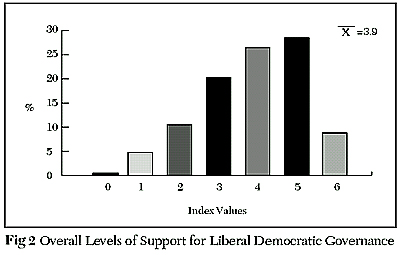2005 Academy of East Asian Studies. pp. 183-217
Appraising the Quality of Democracy in South Korea: From the Perspectives of Ordinary Citizens and their Daily Experiences
by Doh Chull Shin, University of Missouri-Columbia &
Chong Min Park, Korea University
rejecting more than two of them. On the basis of these findings, we can reasonably
conclude that liberal democracy is not in high or strong demand among a
large majority of the Korean people. The insufficiency of such demand must be
considered another powerful force working against liberal democratic development
in Korea.

Summary and Conclusions
This study has proposed three sets of new ideas for a systematic assessment of the quality of democracy from the perspective of ordinary citizens and their daily experiences. The first set of these ideas focuses on the quality of a regime’s democratic performance. The perceived democratic character of a regime and satisfaction among the mass citizenry regarding its performance as a democracy can tell us what level of quality this democracy has attained. A high-quality democracy features high levels of citizen experience in and satisfaction with democratic rule, while a low-quality democracy features low levels of such democratic experience and performance satisfaction. Mixed levels of such experience and satisfaction, on the other hand, engender a medium-quality of democracy. The second set of ideas deals with how well or poorly a regime performs as an electoral democracy. We seek to weigh the sense among adult citizens that the conduct of the presidential elections is fair and their outcomes are acceptable in order to appraise the quality of Korea’s electoral democracy. A regime becomes an electoral democracy of high quality when voters for losing candi-